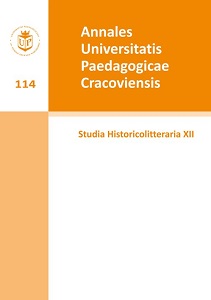Pielgrzym czy wygnaniec? Poszukiwanie tożsamości ludzi wykorzenionych
A pilgrim or an exile? In search of identity of the uprooted
Author(s): Romuald NaruniecSubject(s): Studies of Literature, Comparative Study of Literature, German Literature, Lithuanian Literature, Polish Literature, Identity of Collectives, Asylum, Refugees, Migration as Policy-fields
Published by: Wydawnictwo Uniwersytetu Komisji Edukacji Narodowej w Krakowie
Keywords: uprooted; exile; migration; identity;
Summary/Abstract: A search for identity by ‘the uprooted’, people forced into exile as a result of post-World War II changes in Europe, is a very frequent theme in the 20th century literature. An exile is a perennial wanderer, with no place of his own. The article focuses on the issues of exile, uprooting and a search for new identity, analysing selected works of a German writer Herta Müller; Polish writers: Inga Iwasiów, Stefan Chwin, Tadeusz Konwicki, Czesław Miłosz, Zbigniew Żakiewicz and poets from Vilnius: Romuald Mieczkowski and Henryk Mażul. In her works, Herta Müller deals with a totalitarian state, showing a man trapped in the repressive system. Her protagonists are usually weak and lose against their oppressors. Confronting the past risks bringing back old demons, dangerous emotions and distressing events. The brutality of Müller’s prose lies not only in the depiction of how individuals are uprooted but also how they ‘uproot themselves’. Their lives are a struggle for survival, the latter frequently at the expense of renouncing on their identity, friendship and love. Polish writers (Iwasiów, Chwin, Konwicki, Miłosz, Żakiewicz) present the lot and different life stories of people uprooted after the World War II, without, however, depriving them of their unique personalities and positive features. Forcefully repatriated, fleeing compulsory relocations to Siberia, Polish exiles from the Eastern Borderlands, the territory annexed by the Soviet Union, found a new homeland in Poland, albeit not without initial problems. The memory of their origins, which they retain, accounts for their dual identity. Such duality characterises also the poets form Vilnius (Mieczkowski, Mażul) who write in Polish. Polishness and the Polish culture are constantly present in their works, irrespective of where they live.
Journal: Annales Universitatis Paedagogicae Cracoviensis. Studia Historicolitteraria
- Issue Year: 2012
- Issue No: 12
- Page Range: 81-89
- Page Count: 9
- Language: Polish

